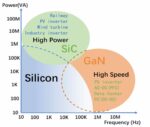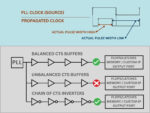For decades, chip design has been a delicate balance of creativity and drudgery. Architects craft detailed specifications, engineers read those documents line by line, and teams write and debug thousands of lines of Verilog and UVM code. Verification alone can consume up to 35 percent of a project’s cost and add many months to … Read More
Electronic Design Automation
GaN Device Design and Optimization with TCAD
I’ve read articles about power electronics, RF systems and high-frequency applications using SiC and GaN transistors, especially in EVs and chargers, but hadn’t looked into the details of GaN devices. A recent Silvaco webinar proved to be just the format that I needed to learn more about GaN design and optimization. Udita Mittal,… Read More
MIN PULSE WIDTH (MPW) TIMING CHECK The Silent Timing Trap Lurking in Every Sub-5nm Design
By Zameer Mohammed
This article claims to provide clear key insights of Min Pulse Width (MPW) timing signoff check, proactive closure strategies for faster time-to-market, and effective methods to prevent silicon failures.
Min Pulse Width (MPW) check for timing signoff has become an important design constraint at the sub-5nm… Read More
Scaling Debug Wisdom with Bronco AI
In the business press today I still find a preference for reporting proof-of-concept accomplishments for AI applications: passing a bar exam with a top grade, finding cancerous tissue in X-rays more accurately than junior radiologists, and so on. Back in the day we knew that a proof-of-concept, however appealing, had to be followed… Read More
CEO Interview with David Zhi LuoZhang of Bronco AI
David Zhi LuoZhang is Co-Founder and CEO of Bronco AI with extensive experience in building AI systems for mission-critical high-stakes applications. Previously while at Shield AI, he helped train AI pilots that could beat top human F-15 and F-16 fighter pilots in aerial combat. There, he created techniques to improve ML interpretability… Read More
Synopsys and TSMC Unite to Power the Future of AI and Multi-Die Innovation
In a rapidly evolving semiconductor landscape, where AI demands unprecedented computational power and efficiency, Synopsys has deepened its partnership with TSMC to pioneer advancements in AI-driven designs and multi-die systems. Announced during the TSMC OIP Ecosystem Summit last week, this collaboration leverages … Read More
AI Everywhere in the Chip Lifecycle: Synopsys at AI Infra Summit 2025
At the AI Infra Summit 2025, Synopsys showed how artificial intelligence has become inseparable from the process of creating advanced silicon. The company’s message was clear: AI is an end-to-end engine that drives every phase of chip development. Three Synopsys leaders illustrated this from distinct vantage points. Godwin… Read More
Neurosymbolic code generation. Innovation in Verification
Early last year we talked about state space models, a recent advance over large language modeling with some appealing advantages. In this blog we introduce neurosymbolic methods, another advance in foundation technologies, here applied to automated code generation. Paul Cunningham (GM, Verification at Cadence), Raúl Camposano… Read More
Synopsys Collaborates with TSMC to Enable Advanced 2D and 3D Design Solutions
Synopsys has deepened its collaboration with TSMC certifying the Ansys portfolio of simulation and analysis tools for TSMC’s cutting-edge manufacturing processes including N3C, N3P, N2P, and A16. This partnership empowers chip designers to perform precise final checks on designs, targeting applications in AI acceleration,… Read More
The Impact of AI on Semiconductor Startups
At the AI Infra Summit 2025 was a panel conversation that captured the semiconductor industry’s anxieties and hopes. The session, titled “The Impact of AI on Semiconductor Startups,” examined how artificial intelligence is transforming not just what chips can do, but how we design them.
The backdrop is stark. Developing a leading-edge… Read More











TSMC vs Intel Foundry vs Samsung Foundry 2026